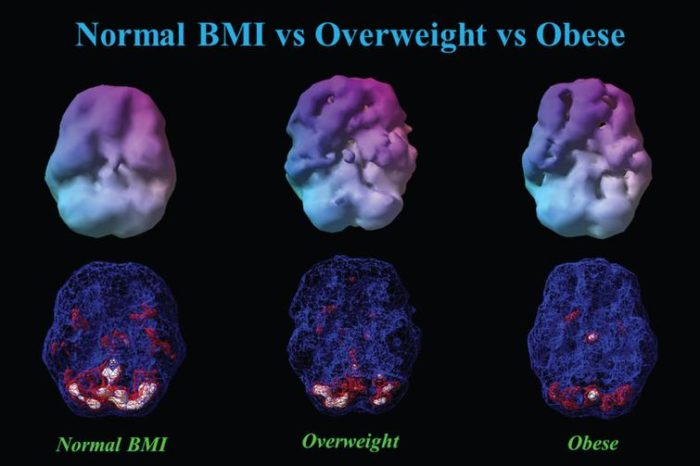This might be the oversimplified conclusion of a new brain imaging study recently published in the Journal of Alzheimer’s Disease.
Of course, the objective of the study was precisely “to identify patterns of cerebral perfusion abnormality in adults as a function of body mass index (BMI) defined weight categories, including overweight or obese status.”
The troubling news is that they found the link between obesity and cognitive decline. And the study benefited from a large psychiatric cohort of 35,442 brain scans across 17,721 adults (mean age 40.8±16.2 years, range 18–94 years). So the results are pretty significant, at least from a statistical point of view.
Overall, the study shows that a higher body mass index correlates with decreased blood flow and brain activity on both resting and concentration CT scans. This behavior was seen in virtually all brain regions, including those influenced by Alzheimer’s pathology, namely the hippocampus. Besides Alzheimer’s disease, low cerebral blood flow is also associated with depression, ADHD, bipolar disorder, schizophrenia, traumatic brain injury, addiction, suicide, and other conditions.
“This study shows that being overweight or obese seriously impacts brain activity and increases the risk for Alzheimer’s disease as well as many other psychiatric and cognitive conditions,” explained Daniel G. Amen, MD, the study’s lead author and founder of Amen Clinics, one of the leading brain-centered mental health clinics in the United States.
The findings are especially worrisome since the latest statistics show that 72% of Americans are overweight of whom 42% are obese. As such, these figures predict a distressing outcome for America’s mental and cognitive health.
Still, there might be a silver lining in this story: reverting to a healthier diet and lifestyle might restore the cognitive abilities.
“One of the most important lessons we have learned through 30 years of performing functional brain imaging studies is that brains can be improved when you put them in a healing environment by adopting brain-healthy habits, such as a healthy calorie-smart diet and regular exercise.” — Dr. Daniel G. Amen
Read more on Eurekalert.






